THE TWELVE CAESARS
ACTA ACCLA, April 2005
VITELLIUS
Emperor January - June 69 CE
Text by Hugh Kramer
Aulus Vitellius, who was to become the ninth Emperor of Rome, was born in September of 15 CE to Lucius Vitellius and his wife, Sextilia. His father was thrice consul and Vitellius became acquainted with the imperial circle at a very young age. As a boy, he spent considerable time at the Capraean villa where the aged Emperor Tiberius had surrounded himself with the juvenile male and female prostitutes he liked to call his "minnows" and this is where Vitellius received his first introduction to vice.
Successive emperors also appreciated his more notorious talents. Caligula admired his skill as a charioteer; Claudius, his skill at dice. Nero admired both of these but was even more indebted to his skill as a flatterer. Vitellius was the most ardent champion of his patron’s lyre-playing and the leader of the sycophants who begged for performances.
Imperial favor led to public office. Achieving the consulship in 48 CE, Vitellius later became the Curator of Public Works and also served as temporary Proconsul of North Africa. Additionally, he was appointed to at least two priesthoods. He was a member of the Arval Brethren, an archaic order of priests charged with maintaining the fertility of plowed fields, and the quindecemviri sacris faciundis, a fifteen member priestly college responsible for guarding the prophetic Sibylline books, but equally well known for its lavish feasts. It was perhaps at these feasts that Vitellius developed his reputation for gluttony.
Vitellius' chance for power came after Nero's death when, to everyone's surprise, the new Emperor, Galba, decided to make him the governor of Lower Germany. According to Suetonius,1 the appointment was due not to his qualifications but rather to his lack of them. Galba is said to have openly stated that a glutton was the sort of rival whom he feared least, and that he expected Vitellius to keep busy cramming his belly with the fruits of the province. If true, this was a major miscalculation on Galba's part.
The legions in Germany were already disaffected by Galba's parsimony. They had expected a bonus for their role in suppressing the revolt of Vindex2 in Gaul and were infuriated by Galba's remark "It is my custom to levy troops, not to buy them". On January 2nd 69 CE, less than a month after Vitellius' arrival, the army of Lower Germany saluted him as Emperor. They were joined shortly thereafter by the soldiers of Upper Germany and they pressed upon him the surname Germanicus.3 Vitellius now had seven legions under his direct command and Roman troops in Gaul, Britain, and Raetia also declared for him.
Vitellius divided his forces, sending two columns under Fabius Valens and Aulus Caecina Alienus marching towards Rome while he remained behind to gather more troops. These forces had scarcely gotten under way when news reached them of Galba's murder and the accession of Otho as Emperor. They pressed on none the less, crossing the Alps and uniting at Cremona, north of the river Po. Shortly thereafter near the town of Bedriacum, they encountered the forces of Otho and routed them. Unable to resist further, Otho committed suicide and, on April 19th, his remaining forces in Rome swore allegiance to Vitellius. The Senate quickly followed suit.
When this news reached Vitellius, he left Gaul and set out for Rome. No soldier himself, he failed to keep his troops reined in and the march degenerated almost immediately into an undisciplined sort of triumphal parade marked by feasting, drunkenness, and disorderly conduct on the part of the men. At the battlefield of Bedriacum, he is said to have gazed upon the unburied corpses and remarked "Only one thing smells sweeter to me than a dead enemy, and that is a dead fellow-citizen".
Vitellius finally entered Rome amid fanfares and trumpets at the end of June. His first acts were uncharacteristically moderate and modest. He replaced the Praetorian Guard with soldiers from the German army, but he pardoned most of Otho's supporters and only gradually assumed the traditional titles of the princeps. Otho's troops were, for the most part, returned to their original posts. More characteristically, he made himself consul for life and enthusiastically sacrificed to the ghost of his former patron, Nero. Suetonius also describes him as banqueting three or four times a day with no feast costing less than 4,000 gold pieces.

Bust of Vitellius
Museo nazionale della Civiltà Romana, Rome
Courtesy of livius.org
The good times however, did not last long. By mid-July, news arrived that the legions of Egypt had declared for a new rival, Titus Flavius Vespasianus, governor of Judaea. The Moesian and Pannonian legions on the Danube quickly followed suit, as did those of Syria and Judaea. These Danube legions, under the command of Antonius Primus and Cornelius Fuscus, descended upon Italy before the Emperor could muster reinforcements from the German armies. While the forces the Emperor had in Italy still outnumbered the invaders, they operated under the severe disadvantage of being virtually leaderless. Vitellius himself was no soldier, his general Valens was ill, and Caecina, who was now a consul, had begun collaborating with the enemy. Thus, when the two sides met in the Second Battle of Bedriacum, the Vitellians were badly beaten. Further forces sent north switched sides without a fight.
Knowing all was lost, Vitellius allowed Titus Flavius Sabinus, city prefect and the brother of Vespasian, to persuade him to abdicate. When he announced this though, the mob and the assembled soldiers protested violently and forced him to recant. Sabinus, together with Vespasian's son Domitian and a small group of supporters, fled to the Capitol and took refuge in the famous Temple of Jupiter, Best and Greatest. Vitellius' German troops attacked them and burned down the temple. Most, including Sabinus, were killed though Domitian managed to escape.
Vitellius frantically sent more peace proposals to the approaching Flavian army but to no avail and within two days (December 20th) the vanguard of their forces entered the city. In a last desperate act, Vitellius dressed in dirty clothing and hid in the janitor’s quarters. Soldiers who came to loot the palace discovered him and, when he was recognized, dragged him along the Sacred Way to the Forum where he was tortured and killed. They then dragged the body with a hook to the Tiber and threw it in. His brother and son were also killed.
History, they say, is written by the victors and they have not been kind to Vitellius. While it is true that he had no military experience and thus was no match for the Flavian generals, the stories of his corruption, arrogance, extravagance and indolence are probably greatly exaggerated. On the other hand, his name did become a byword for gluttony. In the cookbook of Apicius4, which is the oldest European cookbook to have survived until modern times, he is the only Roman emperor to have three recipes recorded with his name on them (as dedication or as the inventor. The other emperors named, each with only one recipe to his credit, are Trajan, Commodus and Elagabalus).
Numismatically, the coins of Vitellius show little innovation but, perhaps, a good deal of irony. Besides the usual claims of victory (including one, RIC 123, where he takes credit for Vespasian’s victories in Judaea) and the restitution of Liberty, there are appeals for Peace (which was not forthcoming) and the loyalty of the armies and the Praetorians (who, in the end, deserted him). Most poignantly invoking the failed hopes and achievements of his short reign is a little denarius depicting the Temple of Jupiter Best and Greatest (RIC 56) which also ended up as ashes.
FOOTNOTES
[ 1 ] Suetonius, author of “The Twelve Caesars”, best known source for information on this reign.
[ 2 ] The revolt of Julius Vindex in Gaul, though eventually quashed, signaled the beginning of the end of the reign of Nero.
[ 3 ] Germanicus, a title as well as a name, means conqueror of Germany. Vitellius hardly deserved it as the only thing German he “conquered” were the affections of the Roman legions stationed there.
[ 4 ] The Roman cookbook of Apicius, in the form it has reached us, was probably compiled in the late 4th or early 5th century.
BIBLIOGRAPHY
THE TWELVE CAESARS by Suetonius. Translated by Robert Graves. Penguin Books, 1979.
De Imperitoribus Romanis VITELLIUS by John F Donahue.
ROMAN COINS AND THEIR VALUES by David R Sear. Spink and Son, Ltd. 2000.
A DICTIONARY OF ROMAN COINS by Seth W Stevenson. Seaby’s Numismatic Publications, 1964.
APICIUS: THE ROMAN COOKERY BOOK translated by Barbara Flower and Elizabeth Rosenbaum. George G Harrap & Co., Ltd, 1974.
SUGGESTED WEB RESOURCES ON VITELLIUS
Aulus Vitellius on livius.org
Suetonius, The Lives of the Caesars - The Life of Vitellius (English)
Suetonius, The Lives of the Caesars - VITELLIVS (Latin)
Vitellius on De Imperatoribus Romanis


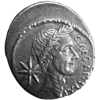 Julius Caesar
Julius Caesar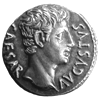 Augustus
Augustus Tiberius
Tiberius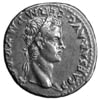 Caligula
Caligula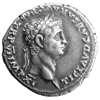 Claudius
Claudius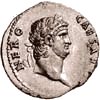 Nero
Nero Galba
Galba Otho
Otho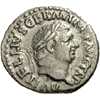 Vitellius
Vitellius Vespasian
Vespasian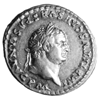 Titus
Titus Domitian
Domitian

